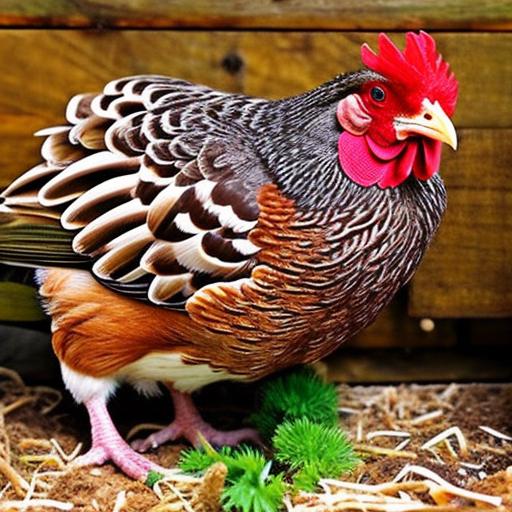Keeping chickens indoors may seem like an unconventional idea, but it is becoming an increasingly popular trend among urban dwellers. While traditionally chickens are kept in outdoor coops or on farms, many people are now exploring the possibility of having these feathered friends inside their homes. In this article, we will explore the benefits and drawbacks of keeping chickens indoors, as well as provide tips on how to care for them in an indoor environment.
Key Takeaways
- Keeping chickens indoors is possible, but requires careful preparation and consideration.
- Benefits of indoor chickens include fresh eggs, pest control, and companionship.
- Drawbacks include noise, odor, and potential health hazards.
- Preparing your home for indoor chickens involves creating a safe and comfortable living space.
- Choosing the right breed of chicken is important for indoor living, with smaller and quieter breeds being ideal.
Benefits of Keeping Chickens Inside Your Home
One of the main benefits of keeping chickens indoors is the ability to have fresh eggs every day. With your own flock of chickens, you can enjoy the luxury of having eggs that are truly farm-to-table. Not only are these eggs delicious and nutritious, but they also provide a sense of satisfaction and self-sufficiency.
In addition to the practical benefits, chickens can also make great pets and provide companionship. They have unique personalities and can be quite entertaining to watch. Chickens are also known to be social animals and can form bonds with their human caretakers. This can be especially beneficial for individuals who may be living alone or looking for a unique pet experience.
Furthermore, indoor chickens can be a great educational tool for children. By having chickens in the home, children can learn about responsibility, animal care, and where their food comes from. It provides an opportunity for hands-on learning and can foster a sense of empathy and compassion towards animals.
Drawbacks of Keeping Chickens Indoors
While there are many benefits to keeping chickens indoors, there are also some drawbacks that need to be considered. One potential drawback is the noise and odor that chickens can produce. Chickens are known to make noise, especially when they are laying eggs or feeling stressed. This can be disruptive in a small indoor space and may not be suitable for individuals who are sensitive to noise.
Additionally, chickens can be messy and require a lot of cleaning. They produce droppings that need to be regularly cleaned up, and their feathers can create a mess. This can be time-consuming and may require more effort than anticipated.
Another drawback to consider is the potential for health concerns. Chickens can carry bacteria such as Salmonella, which can be transmitted to humans. It is important to practice good hygiene and take necessary precautions when handling chickens or their eggs. This includes washing hands thoroughly after handling chickens and ensuring that their living space is kept clean and free of bacteria.
Preparing Your Home for Indoor Chickens
Before bringing chickens into your home, it is important to prepare a safe and comfortable environment for them. This includes providing them with a suitable living space, food, water, and a place to roost.
The living space should be well-ventilated to ensure proper air circulation and prevent the buildup of ammonia from chicken waste. It should also have adequate lighting to mimic natural daylight cycles. Additionally, the space should be secure to prevent any potential escapes or interactions with other pets in the home.
Food and water should be provided in appropriate containers that are easy to clean and refill. Chickens require a balanced diet that includes a mix of grains, vegetables, and protein sources. It is important to research and provide the right type of feed for your chickens’ specific needs.
Choosing the Right Breed of Chicken for Indoor Living
When considering keeping chickens indoors, it is important to choose the right breed that is well-suited for indoor living. Some breeds are quieter and less messy than others, making them more suitable for an indoor environment.
Bantam breeds, such as Silkies or Seramas, are known for their small size and quiet nature. They are less likely to disturb neighbors with excessive noise or create a mess in your home. Other breeds, such as Easter Eggers or Australorps, are known for their friendly and docile temperament, making them great companions for indoor living.
It is also important to choose a breed that fits your lifestyle and living situation. Some breeds require more space or have specific needs that may not be suitable for indoor living. Researching different breeds and their specific characteristics can help you make an informed decision.
Feeding and Caring for Indoor Chickens

Feeding and caring for indoor chickens is similar to caring for outdoor chickens, with a few additional considerations. It is important to provide your chickens with a balanced diet that meets their nutritional needs. This includes a mix of grains, vegetables, and protein sources. It is also important to provide fresh water at all times.
Cleaning their living space regularly is essential to maintain hygiene and prevent the buildup of bacteria. This includes removing droppings, changing bedding, and disinfecting surfaces as needed. Regular cleaning will help keep your home odor-free and reduce the risk of health concerns.
Chickens also require exercise to stay healthy and happy. Providing them with opportunities to stretch their wings and explore their environment is important. This can be done by allowing supervised free-range time in a safe area or providing them with toys and perches inside their living space.
Health and Hygiene Considerations for Indoor Chickens
Keeping indoor chickens requires careful attention to health and hygiene to prevent any potential health concerns. Regular cleaning of their living space is essential to keep bacteria at bay. It is important to use appropriate disinfectants that are safe for chickens and follow proper cleaning protocols.
Monitoring the health of your chickens is also crucial. Regularly check for signs of illness or distress, such as changes in appetite, behavior, or appearance. If you notice any abnormalities, it is important to seek veterinary care promptly.
Additionally, practicing good hygiene when handling chickens or their eggs is essential. Wash your hands thoroughly after handling chickens or their eggs, and avoid touching your face or mouth before doing so. This will help prevent the transmission of bacteria such as Salmonella.
Dealing with Noise and Odor from Indoor Chickens
Minimizing noise and odor from indoor chickens is important to maintain a harmonious living environment. Proper ventilation is key to reducing odor. Ensure that the living space has adequate airflow to prevent the buildup of ammonia from chicken waste. This can be achieved by using fans or opening windows when weather permits.
Regular cleaning is also essential to keep odor at bay. Remove droppings and soiled bedding promptly, and disinfect surfaces as needed. Using odor-absorbing materials, such as baking soda or activated charcoal, can also help reduce any lingering smells.
Training your chickens to be quiet and well-behaved can also help minimize noise. This can be done through positive reinforcement training methods, such as rewarding calm behavior and ignoring excessive noise. Consistency and patience are key when training chickens.
Legal and Zoning Regulations for Keeping Chickens Indoors
Before keeping chickens indoors, it is important to check local regulations and zoning laws. Some areas have restrictions on the number of chickens you can keep or may require permits for indoor chicken keeping. It is important to be aware of these regulations and ensure that you are in compliance.
Respecting your neighbors is also crucial when keeping chickens indoors. Be mindful of noise levels and take steps to minimize any potential disturbances. Communicate with your neighbors about your plans to keep chickens indoors and address any concerns they may have.
Is Keeping Chickens Indoors Right for You?
Keeping chickens indoors can be a rewarding and enjoyable experience for the right person. It provides the opportunity to have fresh eggs every day, enjoy the companionship of these unique pets, and educate children about responsibility and animal care.
However, it is important to carefully consider the benefits and drawbacks of keeping chickens indoors before making a decision. Noise, odor, and potential health concerns are factors that need to be taken into account. Additionally, it is important to research and choose the right breed of chicken that fits your lifestyle and living situation.
By doing your research, preparing your home properly, and being a responsible chicken owner, keeping chickens indoors can be a fulfilling and enriching experience.
If you’re considering keeping chickens inside your house, you may also be interested in learning about the ideal chicken coop nest box design. A well-designed nest box is essential for providing a comfortable and safe space for your chickens to lay their eggs. To ensure you have all the information you need, check out this informative article on chicken coop nest boxes. It covers everything from the size and materials to consider, to tips on placement and maintenance. Happy nesting!
FAQs
Can you keep chickens inside your house?
Yes, you can keep chickens inside your house, but it is not recommended.
What are the reasons for not keeping chickens inside your house?
Chickens produce a lot of dust, dander, and feathers, which can cause respiratory problems for humans. They also have a strong odor and can be noisy.
What are the benefits of keeping chickens outside?
Keeping chickens outside allows them to have access to fresh air, sunlight, and natural foraging opportunities. It also reduces the risk of disease transmission to humans.
What are the basic requirements for keeping chickens outside?
Chickens need a secure coop to sleep in at night, a fenced area to roam during the day, access to fresh water and food, and protection from predators.
What are some common chicken breeds for backyard flocks?
Some common chicken breeds for backyard flocks include Rhode Island Reds, Plymouth Rocks, Leghorns, and Orpingtons.
What should you feed your chickens?
Chickens should be fed a balanced diet of commercial chicken feed, supplemented with fresh fruits and vegetables, and access to grit for digestion.
How often do chickens lay eggs?
Chickens typically lay one egg per day, but this can vary depending on the breed, age, and environmental factors.
Meet Walter, the feathered-friend fanatic of Florida! Nestled in the sunshine state, Walter struts through life with his feathered companions, clucking his way to happiness. With a coop that’s fancier than a five-star hotel, he’s the Don Juan of the chicken world. When he’s not teaching his hens to do the cha-cha, you’ll find him in a heated debate with his prized rooster, Sir Clucks-a-Lot. Walter’s poultry passion is no yolk; he’s the sunny-side-up guy you never knew you needed in your flock of friends!







